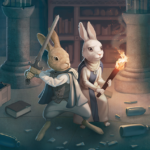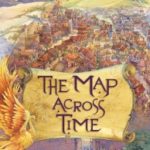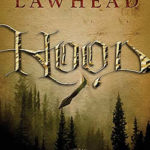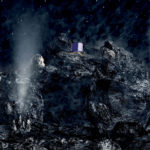Guest Blog – Star Wars, Part 1
Below is the first half of an article by the author of The Book of Names, D. Barkley Briggs. You’ll be hearing more about this young adult novel and its author because in January the CSFF Blog Tour will be featuring this first in the Legends of Karac Tor series. For now, learn a little of his literary background in D. Barkley Briggs on Fantasy, Part 1.
– – –
The original Star Wars changed my life. This is not hyperbole. I’m talking about the first one, of course, Episode IV — the only one that really counts (along with The
Empire Strikes Back). As for the rest,
well…whatever. By the time I was shystered onto the Teddy Bear world of Endor in Return of the Jedi, the pure,
cinematic joie de vivre of the
series had begun to fade. Not because I got older, mind you, but because the original vision was spoiling at the center.
But that’s another article. For a few bright shining moments in
1977, a 9-year old boy named Dean Briggs sat in a darkened theater in Tulsa, OK, with his jaw on the floor and his heart in outer space. What I saw was too real to be special effects, and too true to be untrue. Without reservation, I enlisted
in the cause. I collected the Burger King posters. I dreamed Star Wars. All told, I saw the movie probably 25-30 times, including various re-viewings throughout my adult life. But that first night was red-letter special. The movie became an instant, powerful metaphor. After the show, when my parents took me and my siblings back to my grandma’s house, we sat around her little kitchen table and discussed the various layers of Christian meaning. That’s when I joined the Rebellion against the Empire—against a world system led by a fallen, dark lord. That night, more than air or water or Atari, I longed to wield a glowing saber of light and be a servant to the powers of The Force against the dark side. I was utterly hooked. If it had been a poker game, having been dealt my Royal Flush of Obi-Wan, Luke, Han Solo, C-3PO and R2-D2, I was all in.
Young Skywalker expressed exactly how I felt. When Luke finally
left his old life as a sand farmer for a new life of danger and daring, he told his new Jedi mentor, “I want to come with you to Alderaan. There’s nothing left here for me now. I want to learn the ways of the Force and become a Jedi like my father.” It was his decision. It was my decision, too.
Yes, I know all the ways The Force isn’t really an adequate or
accurate picture of the Holy Spirit. And no, the various symbolisms don’t really line up perfectly with Christianity. They could even be considered perverse or New Agey if you want to get downright cranky about it. You are correct, of course.
I don’t care.
At nine years old, the sum total of the story struck a chord
that still vibrates in my life. For all its theological imperfections, the chord was near enough to pitch perfect — meaning near enough to the heart of the matter — that it became a launching pad for my own faith. Even as a boy, I was a
rather devout follower of Jesus, but I had a wild imagination and it needed fuel. Bless ‘em, the Boxcar Children (or their “Christian” equivalent, the Sugar Creek Gang) just didn’t cut it! Star Wars offered a clear and decisive moment of critical mass, where faith and devotion were recast as adventure, as mission of cosmic scale and terrible importance. Choosing to walk the straight road was no longer merely submission to God, it was wild rebellion against everything else. If I was going to live on planet earth, I was going to be a force to be reckoned with.
This is the power of speculative fiction. This is the
power of fantasy: to capture the mind, to both focus and liberate the emotional, imaginative faculties, to form real and symbolic connections, to viscerally associate yourself with a magical, desirable, grand-scaled life.









































COMMENT: AUTHOR: Jeff Draper DATE: 12/5/2008 3:55:00 AM
Amazing, Star Wars had pretty much the same effect on me.
—– COMMENT: AUTHOR: Rebecca LuElla Miller DATE: 12/5/2008 6:43:30 PM
Jeff, that’s cool! It had a powerful effect on me, too. I generally say that Lewis and Tolkien and Stephen Donaldson had the biggest influence on my writing, but I didn’t really become a fantasy writer until after Star Wars. The world was so real, the conflict so important. It brought back all that I’d felt when I’d read those great novels.
Anyway, be sure to catch part two of Dean’s article.
Becky
—– COMMENT: AUTHOR: DB Ellis DATE: 12/11/2008 6:47:29 PM
As an kid I was in love with star wars (I was 6 when the first one came out and its among the first few movies I ever saw).
As I’ve grown older, though, I’ve found so much in it that I just find…..disturbing.
Among the worst is the fact the droids R2D2 and C3PO are sentient beings bought and sold (and even having their memories wiped) by the people who are supposed to be the “good guys”.
Its slavery, pure and simple, and the films never treat it as if it was in any way problematic. Nor do any other star wars fans when I bring the subject up to them.
The droids are depicted as being untroubled by their slavery (so long as they have a “good” master—none of them want to be owned by Jabba the Hut) and so, apparently, nearly all of the audience for the films casually accepts it as OK as well.
That’s troubled me for a long time. One of the interesting things about works of fiction is that the audience doesn’t just suspend disbelief…..it often suspects its system of values as well.
More and more I find myself on guard as to what unstated and often unnoticed messages a work of fiction is getting under our guard.
—– COMMENT: AUTHOR: Rebecca LuElla Miller DATE: 12/13/2008 9:04:13 PM
Wow, DB, I totally missed that one. I saw the movie first when I was much younger, too, but still an adult. I never moved past the idea that they were machines, but you make an important point as to their sentience.
More and more I find myself on guard as to what unstated and often unnoticed messages a work of fiction is getting under our guard.
Great point! My soapbox comes out with the discussion of reading with discernment. It seems to be the philosophers and theologians who realize the power of story to affect thinking. The rest of us need to catch up and read a lot more critically, I think.
More and more I’m thankful for the teachers I had who worked to make us think.
Becky —–